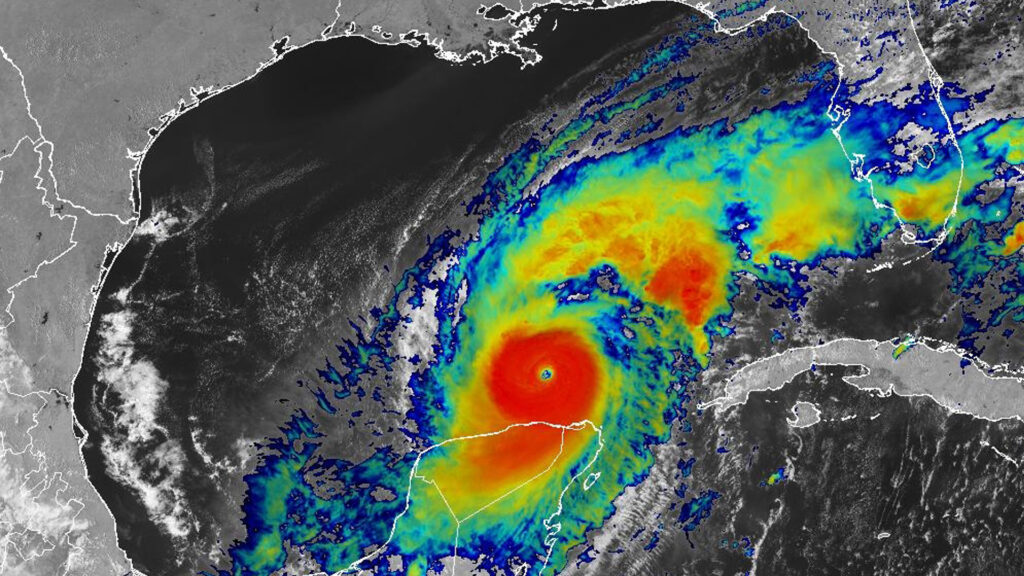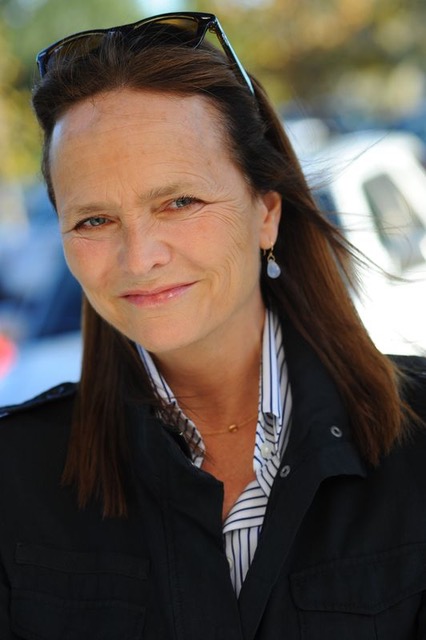By Katie Carpenter, Everwild Media
A veteran meteorologist at NBC6 in Miami, John Morales, recalled that he was just sitting at his desk reading the latest update on Hurricane Milton when the camera light went on. The picture of a working scientist, he suddenly understood the enormity of the situation about the storm that was about to slam into Florida. On the air, in the moment, he cried.
“It has dropped 50 millibars in 10 hours,” Morales said, choking up. This technical mumbo-jumbo might not in itself have been very memorable, but the way that he said it caught me off guard. Like: Is that guy crying on camera?
Stunned, what’s the first thing you’d do? Google “millibars,” of course. These units of pressure on a barometer can tell you how dangerous a hurricane will be. The lower the millibars, the higher the wind speeds.

Morales was reading a scientific report, but envisioning images in his head of ruined houses, flooded streets and devastated families. And then, I saw them too, like those “previsions” from the movie “Minority Report.” Morales transmitted, as if telepathically, his little mental movie previsioning doom to me, with a catch in his voice and red, wet eyes. This dude’s not a wimp, he’s a hero.
Later that day, we heard other reporters talk of a possible designation of Category 6 that might be needed for forecasts in the future. Cat 5 only went up to 192 mph wind speeds, but Milton was already at 180 mph, so how would they make that call? Check the millibars, I thought!
So, John Morales sent me on an adventure of discovery, down the rabbit hole into climate.gov, NewScientist.com, YouTube, TikTok and Instagram, by then all loaded up with astonishing images of extreme winds and rain needing to be better understood. My home was not in the Track Forecast Cone (otherwise known as the Cone of Uncertainty – what a terrible name), but the town next door got hit with a tornado. I’m glad we were on alert, thanks to Morales’ tears.
Now I can tell friends, with something that sounds like certainty, that millibars reading below 900 is dangerous (“I Googled it!”, I say). “This is just horrific,” Morales continued. “You know what’s driving that, I don’t need to tell you. Global warming. Climate change.”
Right there, he said it out loud. So, what’s with Florida officials?
Florida Gov. Ron DeSantis has been quoted as saying, “I’m not a global warming person.” Like it’s a personal preference, not a scientific fact, that the temperature is literally warming. Like chocolate over vanilla, like, “I’m not a golf guy.” Or, “I’m not an earth-is-round person.” How about, “I don’t believe bananas have potassium.” You do believe it; someone you trust told you so.
What DeSantis likely meant was “I’m not a global warming kind of person,” like I don’t rally for bike lanes, or throw pots or wear tie-dye … cultural things. Because belief in global warming is sometimes seen as cultural, like you believe in it because your people believe in it. You haven’t really done the scientific research yourself, you just learned about it on TV.
DeSantis has been good for environmental funding in Florida, in some ways. But it’s this other disconnect I don’t understand. It’s not helping. And he’s not alone.

Recent media research found that “storms have given rise to a flood of absurd mis- and disinformation, boosted by a legion of online grifters and politicians,” according to the Columbia Journalism Review. Some meteorologists have even reported receiving death threats.
For at least one reader of Rolling Stone, this brought to mind a “Simpsons” episode in which a direct hit from a comet is averted, and Moe the bartender says, “Let’s go burn down the observatory so this’ll never happen again!” What do you do when you know the observatory can’t lie, yet your neighbors are at the gate with flaming pitchforks?
One-third of the meteorologists surveyed by Climate Central said they felt the need to report an “opposing viewpoint” on climate change. And why shouldn’t they – the “opposing viewpoint” often comes from some powerful people.
“This is on both sides,” said DeSantis. “You kind of have some people think government can do this, and others think it’s all because of fossil fuels.” It was weirdly reminiscent of Donald Trump’s quote after the fatal clash of protestors and neo-Nazis in Charlottesville: “You also had some very fine people on both sides,” he said.
We have some distance to go before most of us can agree that the side that says there’s a problem has more expertise than the other side, the kind of knowledge that can save your life.
Katie Carpenter is a West Palm Beach-based filmmaker with Everwild Media (www.everwildmedia.com), producing documentaries about conservation, climate change and solutions.
If you are interested in submitting an opinion piece to The Invading Sea, email Editor Nathan Crabbe at ncrabbe@fau.edu. Sign up for The Invading Sea newsletter by visiting here. Banner image: A satellite image of Hurricane Milton on Oct. 8 (VIIRS imagery from the NOAA-21 Satellite, Public domain, via Wikimedia Commons).




The clock is moving closer to midnight and extinction!